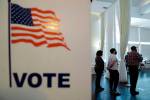Trump’s come too far to be turned back now
LOS ANGELES — You could be forgiven for longing for the days when party bosses picked candidates, not voters in hard-fought caucuses and primaries. If you were a political party boss, that is.
But today, long after the infamous 1968 election in which Democratic leaders nominated Hubert Humphrey despite his not winning a single primary, when the hunt for delegates consumes campaigns behind the scenes, and when states jeolously guard their early spots on the primary calendar, it’s just too late.
That was one of the points which emerged during one of several political discussions at last weekend’s Los Angeles Times Festival of Books at the University of Southern California, where authors and politicos gathered to assess the 2016 election, primaries and the Donald Trump phenomenon.
If Trump is denied the Republican Party’s nomination despite being the overwhelming front-runner in terms of votes and delegates, the Republican Party will “blow up,” said Robert Shrum, the Democratic political consultant. Allowing party bosses to nominate someone else — especially a someone else who hasn’t been running for the job — would destroy the legitimacy of the process, Shrum added.
Given that millions of Republicans have cast votes or caucused for Trump, denying him the nomination would be “very dangerous,” agreed author and USC journalism professor Nicco Mele. (Not in the sense of physical danger, despite Trump’s prediction of “riots,” but dangerous to the Republican Party and its teetering coalition of business, social and economic conservatives.)
Geoffrey Cowan, author of a book on the rise of presidential primaries, recounted three reasons Republican Party leaders aren’t as excited about Trump’s rise as the party’s membership: First, the tone of his remarks tends to turn off key voting constituencies. Second, he’s too liberal for a party that might otherwise nominate a conservative such as Texas Sen. Ted Cruz. And third (and perhaps most important!), the party’s leaders don’t want to give up control to Trump. (Despite the power of parties to set rules for electing their nominee, they’re actually fairly weak organizations, driven more by the candidates than the insiders, according to author and historian Nancy L. Cohen. That’s why the GOP appears ready to nominate a candidate who’s not anybody’s idea of a real Republican, and Democrats are handing wins to a man who’s never been a registered member of their party, she said.)
Still, the Republicans have no one to blame but themselves. After embracing the tea party in 2010 and 2014, Trump’s rise was inevitable, Shrum said. And former Guardian reporter-turned-author Andrew Gumbel said Trump’s rise was also predictable in the theatrical sense. Voters fell in love with his tendency to break the political rules, rejecting the false civility of the campaign trail to openly insult rival candidates, and saying outrageous things and never backing down. Those reality TV techniques also entertained the media, which should have been asking Trump harder questions much earlier, Gumbel said.
But could it have been different? The party did serve up plenty of establishment candidates, people GOP leaders thought were electable. Voters rejected Florida Sen. Marco Rubio and ex-Florida Gov. Jeb Bush, however. “The dogs didn’t like the dog food,” Shrum summed.
So now, having built their own gallows, both in terms of party rules as well as fostering an environment in which Trump could thrive, Republicans are left with little choice but to embrace him, or see their house divided to the point of destruction.
Shrum recalled a quote from former President Kennedy’s inaugural address: “Those who ride on the back of the tiger often end up inside.”
Steve Sebelius is a Review-Journal political columnist and co-host of the show “PoliticsNOW” airing at 5:30 p.m. Sundays on 8NewsNow. Follow him on Twitter (@SteveSebelius) or reach him at 702-387-5276 or SSebelius@reviewjournal.com.























